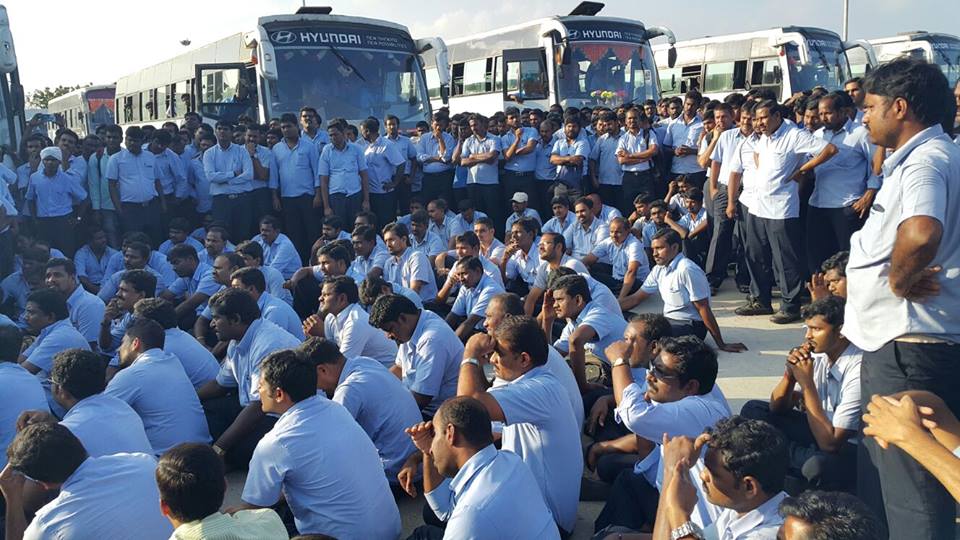In a big victory for unionization and workers’ rights, South Korean auto major Hyundai’s India arm was ordered by a Kancheepuram labor court in the Indian State of Tamil Nadu to pay back the money it had illegally withheld from over 50 workers since 2007. The company had decided to cut wages of the daily workers for eight days on the premise of a 90-minute strike against the management. The court declared that the claim of Hyundai Motors India that the workers were involved in an illegal strike had not been proved. Therefore, the eight-day wage cut initiated by the company against the workers was illegal. The company now has to pay back the workers the wages lost with interest. The money has already been deposited with the court, and the workers are awaiting its disbursal.
The victory of the workers is a symbol of the long and enduring fight against corporate oppression. Speaking to Newsclick, S. Kannan, district president of the Centre of Indian Trade Unions (CITU), Kancheepuram, said: “The Hyundai workers’ struggle paves a path for other workers’ struggles in the future. For example, 28 people have lost their jobs in the state (Tamil Nadu) because they dared to form a union in Asahi India Glass Limited. They are sitting on hunger strike for the past six days. The struggle will continue, but this experience gives us hope.”
Elaborating on the struggle, Muthu Kumar, Hyundai union president, said, “In 2007, when we started the union in Hyundai, the company management treated us badly, stating that a union was not permitted here. We went ahead and that led to a problem in the production side and at the machine area of the factory, which halted production for an hour. The management said this was an illegal strike. They cut eight days’ salary of 51 workers for this. [The other 47 workers faced disciplinary action of various sorts] Workers argued that there was no willful act and they had not done anything against the law. They filed a claim petition with the Deputy Labour Commissioner for loss of pay as they didn’t go on any strike.”
Kannan said: “The union had to put up a prolonged fight against the management. The workers had to spend about Rs 3-4 lakh as legal fee to fight this battle. It was the money of the common people and this is a victory of the workers.” He added, “This is not about one case, this is about the collective strength of unionization.”
The fight of the Hyundai workers was an uphill struggle as the issue did not get resolved though labor conciliation and went to the labor court in Chennai in 2009. The case was subsequently transferred to the Kancheepuram district labor court in 2018. The company still has the option of challenging the order in a higher court. Currently, no penalties have been imposed on the company for illegally withholding the rightful wages. Many have pointed to these factors as evidence of the anti-worker bias of various institutions.
The victory also has to be seen in the national context, where the newly re-elected far-right government of Narendra Modi is expected to introduce ‘big bang’ economic reforms to please foreign investors. These will include changes in labor laws, privatization, and creation of land banks for new industrial development.
In its previous term, the Modi government proposed to combine 44 central labor laws into four codes — on wages, industrial relations, social security and welfare and occupational safety, health and working conditions. Due to intense opposition from workers across the country, these codes have not yet been passed by Parliament. The move is directly aimed at giving a free hand to companies to hire and fire workers and reduce their bargaining power in cases of disputes. It is feared that the newly elected government will press ahead with moves to dilute these labor laws.





